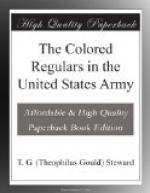“I ordered the troop forward at once, telling them to take advantage of all cover available. In the meantime the volleys from the Spanish were coming in quite frequently and striking the ground on all sides near where we were. I found it very difficult to move the men forward after having found cover, and ran back to a portion of the troop near an old brick wall, and ordered them forward at once. They then made a dash forward, and in doing so three or four men were wounded, Private Russell severely. Who the others were I do not know. We encountered a severe fire directly after this move forward; and Private Wheeler was wounded in the left leg. There was a wire fence on our right, and such thick underbrush that we were unable to get through right there, so had to follow along the fence for some distance before being able to penetrate. Finally, was able to get the greater proportion of my men through, and about this time I met Lieutenants Fleming and Miller, Tenth Cavalry, moving through the thicket at my left. I there heard the order passed on ‘not to fire ahead,’ as there was danger of firing into our own forces. In the meantime there was shouting from the First Cavalry in our front, ‘Don’t fire on us in rear.’ My troop had not fired a shot to my knowledge, nor the knowledge of any non-commissioned officers in the troop. About this time I found I was unable to keep the troop deployed, as they would huddle up behind one rock or tree, so I gave all sergeants orders to move out on the extreme right and to keep in touch with those on their left. Then, with a squad of about five men, I moved to the right front, and was unfortunate enough to lose the troop, i.e., I could see nothing of them except the men with me.
“But as I had given explicit instructions to my sergeant, in case I was lost from them, to continue to advance until halted by some one in authority, I moved ahead myself, hoping to find them later on. In making a rush forward three men of my squad were lost from me in some way. I still had two men with me, Privates Combs and Jackson, and in the next advance made I picked up a First Cavalry sergeant who had fallen out from exhaustion. After a terrific climb up the ridge in front of me, and a very regular though ineffective fire from the enemy kept up until we were about sixty yards from the summit of hill, we reached the advance line of the First United States Cavalry, under command of Captain Wainwright. I then reported to him for orders, and moved forward when he next advanced. The firing had ceased, and no more shots were fired, to my knowledge, after this time. With the First Cavalry, Troop G, we followed along the right of the ridge and came down to the right front, encountering no opposition or fire from the enemy, but finding the enemy’s breastworks in confusion, ammunition and articles of clothing scattered around; also one dead Spaniard and two Mauser rifles. At the foot of the ridge we met some of the First




